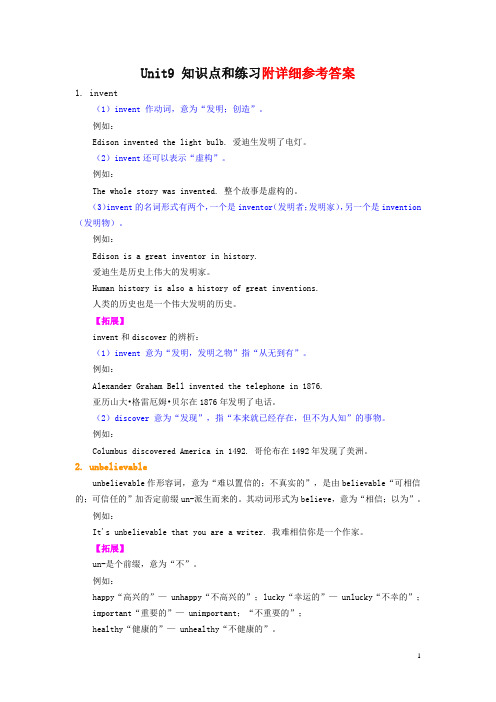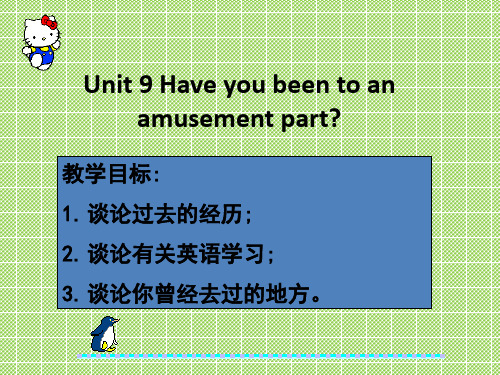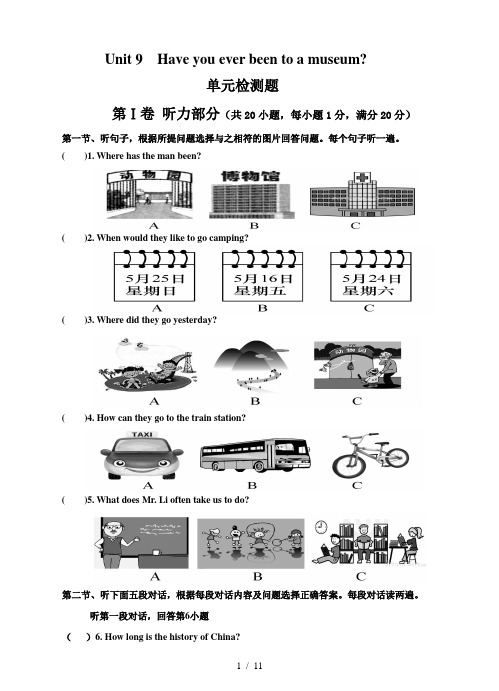2018年人教新目标英语八年级下册unit 9《Have you ever been to a museum》 section a课件
人教版新目标英语八年级下册:Unit 9《Have you ever been to museum》 讲解+练习题目+答案

Unit9 知识点和练习附详细参考答案1. invent(1)invent 作动词,意为“发明;创造”。
例如:Edison invented the light bulb. 爱迪生发明了电灯。
(2)invent还可以表示“虚构”。
例如:The whole story was invented. 整个故事是虚构的。
(3)invent的名词形式有两个,一个是inventor(发明者;发明家),另一个是invention (发明物)。
例如:Edison is a great inventor in history.爱迪生是历史上伟大的发明家。
Human history is also a history of great inventions.人类的历史也是一个伟大发明的历史。
【拓展】invent和discover的辨析:(1)invent 意为“发明,发明之物”指“从无到有”。
例如:Alexander Graham Bell invented the telephone in 1876.亚历山大•格雷厄姆•贝尔在1876年发明了电话。
(2)discover 意为“发现”,指“本来就已经存在,但不为人知”的事物。
例如:Columbus discovered America in 1492. 哥伦布在1492年发现了美洲。
2. unbelievableunbelievable作形容词,意为“难以置信的;不真实的”,是由believable“可相信的;可信任的”加否定前缀un-派生而来的。
其动词形式为believe,意为“相信;以为”。
例如:It's unbelievable that you are a writer. 我难相信你是一个作家。
【拓展】un-是个前缀,意为“不”。
例如:happy“高兴的”— unhappy“不高兴的”;lucky“幸运的”— unlucky“不幸的”;important“重要的”— unimportant;“不重要的”;healthy“健康的”— unhealthy“不健康的”。
八年级英语下册Unit9Haveyoueverbeentoamuseum题型总结及解题方法(带答案)

八年级英语下册Unit9Haveyoueverbeentoamuseum题型总结及解题方法单选题1、Miss Chen, my dear English teacher, often encourages me ______the challenges in my study. A.faceB.facesC.facingD.to face答案:D句意:陈老师,我亲爱的英语老师,经常鼓励我面对学习中的挑战。
A. face动词原形;B. faces动词三单式;C. facing分词或动名词;D. to face动词不定式。
encourage sb. to do sth.鼓励某人做某事,故答案为D。
2、We can see ________ stars at night if there are no clouds in the sky.A.thousand ofB.a thousandsC.thousands ofD.two thousands of答案:C句意:如果天空中没有云,我们可以在晚上看到成千上万的星星。
考查数词的用法。
基数词后thousand用原形,thousand与of连用时用thousands of表示“数以千计的”。
故选C。
3、--It's 20 years since we came back to Liangshan.--How time flies! We ___________ in our hometown for such a long time.A.workB.workedC.has workedD.have worked答案:D句意:——我们回到凉山20年了。
——时光飞逝!我们在家乡工作了这么长的时间。
考查动词的时态。
work动词的一般现在时的原形;worked动词的过去式;has worked动词的现在完成时,主语是第三人称单数;have worked动词的现在完成时态。
人教新目标英语八年级下册讲义—Unit 9 Have you ever been to a ……

新目标八年级下册Unit 9 Have you ever been to a museum ?讲义一、重点单词1. amusement n. 娱乐; 游戏2. somewhere adv. 在某处; 到某处3. camera n. 照相机; 摄影机; 摄像机4. invention n. 发明物5. invent v. 发明; 创造1. unbelievable adj. 难以置信的; 不真实的2. progress n. 进步; 进展3. rapid adj. 迅速的; 快速的4. unusual adj. 特别的; 不寻常的5. toilet n. 坐便器; 厕所6. encourage v. 鼓励7. social adj. 社会的8. peaceful adj. 和平的; 安宁的9. performance n. 表演; 演出10. perfect adj. 完美的; 完全的11. itself pron.(it的反身代词) 它自己12. collect v. 收集; 采集13. German adj. 德国的; 德语的; 德国人的n. 德语; 德国人14. theme n. 主题15. ride n. 供乘骑的游乐设施; 短途旅程16. province n. 省份17. simply adv. 仅仅; 只; 不过18. fear v. & n. 害怕; 惧怕19. whether conj. 不管......;还是); 或者......(或者); 是否20. Indian adj.印度的 n. 印度人21. Japanese adj.;日本的; 日本人的; 日语的n. 日本人; 日语22. equator n. 赤道23. whenever conj. 在任何......时候; 无论何时24. spring n. 春天25. mostly adv. 主要地; 通常26. location n. 地点; 位置二、短语归纳1.at night在夜晚2.in a more natural environment在一个更加自然的环境中3.all year round 全年4.be far from 离……远5.in the dark 在黑暗中6.in the past 在过去7.have been to sp. 去过某地8.science museum 科学博物馆9.history museum 历史博物馆10.amusement park 游乐园11.go somewhere different 去不同的地方12.go skating 去滑冰13.take the subway 坐地铁14.a great way to spend a Saturday afternoon一个过周六下午的好方法15.all the old movie cameras所有的古老的电影摄影机16.learn about sth.解有关……的情况17.on the weekend 在周末18.camp in the mountains 在大山里露营19.put up a tent搭帐篷20.in such a rapid way 以如此迅猛的方式21.different kinds of各种各样的22.development of toilets 厕所的发展23.social groups 社会团体24.the tea art performances茶艺表演25.make a perfect cup of tea with beautiful tea sets用漂亮的茶具沏一杯完美的茶26.a nice place to enjoy tea 一个品茶的好地方27.thousands of 数以千计的28.International Museum of Toilets国际厕所博物馆29.the Terracotta Army 兵马俑30.Southeast Asia东南亚31.Night Safari 夜间动物园32.three quarters 四分之三33.an English-speaking country一个讲英语的国家34.have problem doing sth. 做某事很困难35.during the daytime在白天36.a couple of times 好几次37.right now 现在;目前38.an amusement park with a special theme一个有特别的主题的游乐园39.walk around the park 在公园里到处走40.hear of 听说41.take a ride兜风42.another province另一个省43.the Bird’s Nest鸟巢44.encourage sb. to do sth.鼓励某人做某事45.on the one hand... on the other hand.一方面,另一方面三、句型集萃1.a great way to do sth一个做某事的好办法2.It’s unbelievable that很难相信……3.watch sb do sth.看某人做了某事4.encourage sb to do sth鼓励某人做某事5.as..as和。
Unit9《Haveyoueverbeentoanamusementpark_SectionA》课件1(39页)(人教新目标八年级下)

neither
(1) She isn’t a student. Neither am I (2) I can’t swim. Neither can he. (3) My husband doesn’t want to see a
movie tonight, and neither do I. (4) A: I haven’t seen that movie. Neither has he. (5)I didn’t go to school today. Neither did he ?
So 的用法
(1) She is a student, so am I (2) I can swim, so can he. (3) My husband wants to see a movie tonight, and so do I. (4) I have seen that movie, so has he. (5) I went to school today, so did he ?
2a Listen and circle the places you hear.
2b
Tina went to the space museum last year. John has never been to the space museum. They are going to take the subway. Linda has been to the aquarium. Linda went to the zoo three times last year. Linda is going to the zoo again next week. Harvey had a great time at Water World. Harvey’s friend has never been to W W. Harvey and his friend are going skating.
Unit9Haveyoueverbeentoamuseum_SectionA1a-2c课件人教版英语

Free talk Have you ever been to a/an_...? Yes, I have. /No, I haven’t.
have been to (去过),可 以与never[从没], ever [曾经], just[刚刚], once [一次], before[之前]连接。
ahsnmsciapsiawetutaruonscatrrecetmeymemrmzumeopusnuuoeastsuserepeumkuuammrmk
“我也是”结构: So+助动词/情态动词/be+主语(肯定) “So+助动词/be动词/情态动词+主语I.”=Me,too.
Drills --I have ever been to _a_s_c_i_en__ce__m__u_se_u_m___.
Have you ever been there?
回答1:Yes, __I_h_a_v_e___.
➢ 拓展:表示后者与前者情形相同,即“……也不……”时, 常用Me neither.或neither/nor引起的倒装句: Neither/Nor+助动词/系动词be/情态动词+主语.
时态上与前文保持一致,数要与其后的主语一致。
例:—I have never been to a water park.
Look at the map of the town. Listen and circle the places you hear.
2b Listen again and circle T for true or F for false.
Conversation 1
1. Tina went to the space museum last year. T/F
人教版新目标初中英语八年级下册Unit9-Have-you-ever-been-to-a-museum单元检测题及答案

Unit 9 Have you ever been to a museum?单元检测题第Ⅰ卷听力部分(共20小题,每小题1分,满分20分)第一节、听句子,根据所提问题选择与之相符的图片回答问题。
每个句子听一遍。
()1. Where has the man been?()2. When would they like to go camping?()3. Where did they go yesterday?()4. How can they go to the train station?()5. What does Mr. Li often take us to do?第二节、听下面五段对话,根据每段对话内容及问题选择正确答案。
每段对话读两遍。
听第一段对话,回答第6小题()6. How long is the history of China?A. Over 5,000 years.B. About 5,000 years.C. Less than 4,000 years.听第二段对话,回答第7小题()7. Where is Mr. Green?A. In the library.B. At home.C. In the office.听第三段对话,回答第8小题()8. When did Mr. Smith move to New York?A. In 2005.B. Six years ago.C. In 2000.听第四段对话,回答第9小题()9. Which mount did the man visit?A. Mount Hua.B. Mount Tai.C. Mount Heng.听第五段对话,回答第10小题()10. Whose backpack is it?A. Nancy’s.B. Sally’s.C. Cindy’s.听第六段对话,回答第11和12小题。
每段对话读两遍。
( )11. Where did Dad put the meat?A. On the tableB. On the chairC. In the fridge(冰箱)( )12. Why do they need some more meat?A. Because dad forgot to bring the meat home.B. Because mum ate it for lunch.C. Because grandfather and grandmother are coming.听第七段对话,回答第13至15小题。
人教新目标八年级英语下册Unit9 Have you ever been to a museum-单元练习【含答案】
人教新目标版八年级下册Unit9 Have you ever been to a museum?单元练习一、听力(听力)(共20小题;共20分)I. 听句子,选择正确答语。
1. A. I'm afraid you can't. B. That's great. C. It doesn't matter.2. A. Good idea. B. At 7 o'clock. C. Not at all.3. A. No, please do it.B. Yes, you can do it.C. It's very kind of you.4. A. She is better now.B. She likes dancing.C. She is tall and pretty.5. A. Since last month. B. September. C. Six o'clock.II. 听对话,选择正确答案。
6. How long has he stayed in China?A. Two weeks.B. A week.C. A month.7. What is she going to be?A. An English teacher.B. A tour guide.C. A math teacher.8. Who has ever been to a water park?A. Sarah.B. Ben.C. Tina.9. How many English-speaking countries has she been to?A. Three.B. Four.C. Five.10. How long did the film last?A. An hour and a half.B. Two hours.C. 150 minutes.III. 听对话,选择正确答案。
八年级英语下册_Unit_9_Have_you_ever_been_to_an_amusement_park_section_A课件_人教新目标版
语法归纳
. Me neither. Let’s go to one tomorrow.
我也没去过。我们明天去参观一家吧。 【句型剖析】
neither 用 作 副 词 , 意 为 “ 也 不 ” , 常 用 于 句 首 , 如 Me
neither(=Neither have I), 表示前面否定的内容也适合于另一个 人或物。置于句首时, 主语要放在助动词、系动词或情态动词
你曾经去过…吗?
A: Have you ever been to a beach? B: Yes, I have.
the Great Wall
A: Have you ever been to …? B: No, I haven’t.
zoo
பைடு நூலகம்
A: Have you ever been to a zoo? B: Yes, I’ve been to a zoo.
an aquarium
water park
a space museum
an amusement park
1a Which of these places would you like to visit? Rank them from 1 to 5.
space museum __History museum art museum water park zoo ___amusement park
n. 娱乐;消遣
太空博物馆
历史博物馆
艺术博物馆 水上公 园 动 物 游 乐 园 场
迪斯尼乐园旁边有一条10米宽的河流,游 客可乘船游览。河流两岸森林茂密,不时传来 阵阵猿鸣声。岸边有走动的大象,河里经常有 鲨鱼和海豹的出没。听起来挺原始的。不过, 这些人和鸟兽多数是人造的,由电子仪器控制。 乐园内也有dining room, shop, movie house, coffee house 等公共场所。整个游乐园 仿佛是洛杉矶的一座卫星城,被视为现代游乐 场所的奇迹。迪斯尼游乐园吸引了世界著名 各地众多的游客,是孩子们心目中的天堂。
八年级英语下册Unit9Haveyoueverbeentoanamusementpark词汇详细用法人教新目标版
Unit 9 Have you ever been to an amusement park ?68页1.amusement [ u ] 娱乐、消遣an amusement park 游乐场Have you ever been to an amusement park? 你曾经去过一个游乐场吗?Fun Times Amusement Park 欢乐时光游乐场。
复习have been to 去过,回来了have gone to 去了,现在不在这里have been in 去了,还在那里2. neither① adj. pron 二者都不Neither answer is correctNeither of the answers is / are correct.Which do you like? Neither I think they’re both ugly.② adv. 也不I don’t know. Me neither. I don’t know, either.70页3. Disneyland 迪斯尼乐园(前无冠词)Have you ever been to Disneyland?In fact, there are now several different Disneyland amusement parks around the world. 事实上,现在世界上有好几处不同的迪斯尼游乐场。
around the world = all over the worldacross China = all over China4. Mickey Mouse 米老鼠5. Donald Duck 唐老鸭6. character①性格I know his character very well.②汉字Chinese characters③人物、角色famous characters from Chinese historyDisney characters 迪斯尼人物Mickey Mouse and Donald Duck are famous Disney characters.7. seen see的过去分词。
新目标人教版初中英语八年级下册Unit9Haveyoueverbeen
Unit 9 (8B) Have you ever been to anamusement park?I. Teaching aims1.Help the students master the words and expressions.2.Help the students learn to talk about the places they havebeen to.3.Realize the beautiful life and enjoy it.II. Key points and difficulties1.The patterns of “ have/has been to”.2.Talking about the places they have been to.III. Teaching methodsListening, oral and writing practice.IV. Studying methodsPairwork and groupwork.V. Teaching procedures:Step 1 Warm up and lead inA guessing game and a short video to present “have been to”.Step 2 PairworkLearn the new words with the help of pictures. Then present thenew dialogue and have the students practice the dialogue.Step 3 1b listen and find out what places they have been to.Step 4 Game(magic eyes)Show the photos of some places quickly, have the students tell the answers quickyly. It is to practice “He/She has been to…”Step 5 2a Listening. Listen and circle the places they hear.Step 6 2b ListeningStep 7 GroupworkWork in groups of four. Take turns to ask their partners. The others answer the questions as quickly as you can.Step 8 SummaryAsk the students to summarize what we learned. (words and expressions)Step 9 Surveyone of their friends and write the report.their passages in class.Step 10 HomeworkWrite about one of their own trips by using what they have learned.Enjoy traveling!Survey one of your friends and try to write your report.1.Do you like going out on vacation ?Very much A little Not at all2.How often do you go out to have fun?Usually Often Sometimes Never 3.Where have you been?_______________________________4.When did you go to …?_______________________________5.Where are you going next vacation?_______________________________6.How are you going there?Other ways ___________7. (other questions you want to know)…Report: My good friend … likes …. She/He…。
- 1、下载文档前请自行甄别文档内容的完整性,平台不提供额外的编辑、内容补充、找答案等附加服务。
- 2、"仅部分预览"的文档,不可在线预览部分如存在完整性等问题,可反馈申请退款(可完整预览的文档不适用该条件!)。
- 3、如文档侵犯您的权益,请联系客服反馈,我们会尽快为您处理(人工客服工作时间:9:00-18:30)。
I My friend
Listen again and circle T for true or F for false. Conversation 1
Tina went to the space museum last year. T F
John has never been to the space museum. T F
T
T
T
Role-play the conversation.
3a Three students talk about the most interesting museums they have ever been to. Read the magazine article and answer the questions. 1. Which three museums do the students talk about? Computer museum, the Internet Museum of Toilets and National Tea Museum. 2. What do you think is the most interesting thing about each museum? A special computer could play chess even better than humans. There was different kinds of toilets there. Watching people prepare the tea with the beautiful tea sets.
Guessing game
Have you ever been to…? Yes, I have./No, I haven’t.
You can see many animals in it. There is one in Jinan.
Have you ever been to…? Yes, I have./No, I haven’t.
zoo park
Report: I have ever been to …, but I have never been to…. My friend has ever been to…, but he/she has never been to ….
Amusement park museum
supermarket
They are going to take the subway. T F
Conversation 2
Linda has been to the amusement park. T F
Linda went to the amusement park yesterday. T
Linda is going to the amusement park again by bike. T F
Presentation
A: Have you ever been to an amusement park? B: Yes, I have. I went to Fun
Times Amusement Park last
year. Have you ever been to a water park? A: No, I haven’t. B: Me neither .Let’s go to
Unit 9 Have you ever been to a museum?
Section A
Lead in
Think about these questions:
Do you like traveling? How many places of interest have you visited? How do you like trank had a great time at the water park.
F
Frank’s friend has never been to the water park. F Frank and his friend are going skating. F
You can take a walk in it. And it is beautiful.
Have you ever been to…? Yes, I have./No, I haven’t.
You can buy many things in it.
Have you ever been to…? Yes, I have./No, I haven’t.
Water City tomorrow.
Listen.
Have these students ever been to these places? Check( ) the boxes.
Science museum Claudia Sarah History museum Nature Space museum museum museum Art
You can see many old things in it.
Practice museum
I have ever been to …
I have never been to… She\He has ever been to… She\He has never been to…
park
zoo
you ?
space museum A: Me, too.
A: Have you ever been
to…?
B: Yes, I have. /No, I
amusement park
haven’t. How about you?
A: … water park
Interview A: Have you ever been to…? B: Yes, I have./I have ever been to… No, I haven’t./I have never been to…
PAIRWORK A: Have you ever been to a water park? B: No, I haven’t.
A: Me neither. water park
A: Have you ever been to a
space museum?
B: Yes, I have. How about
